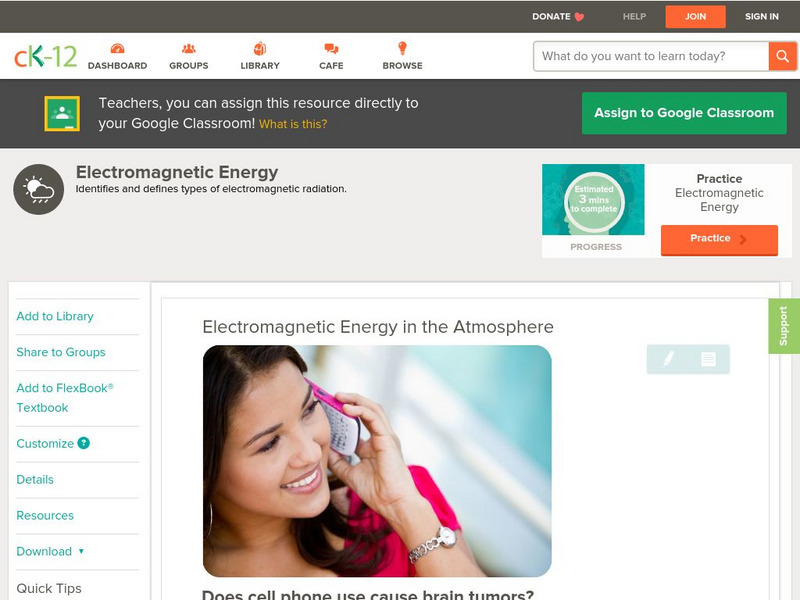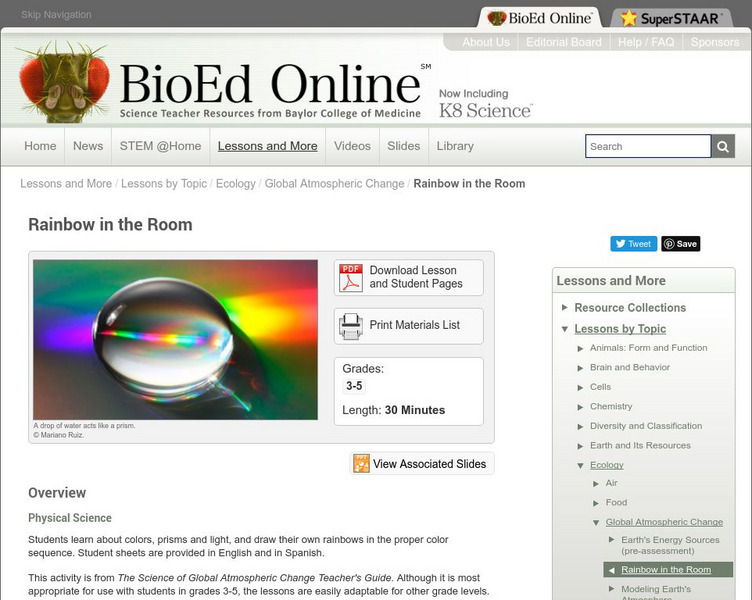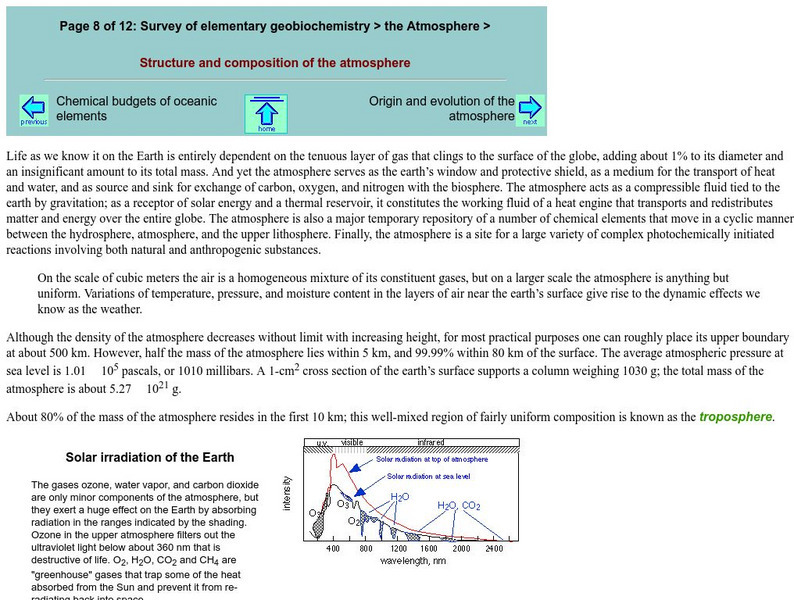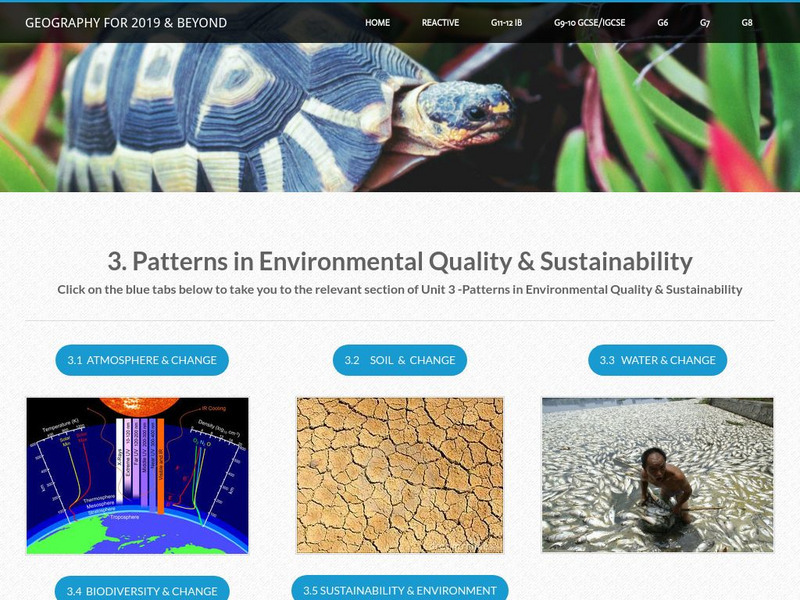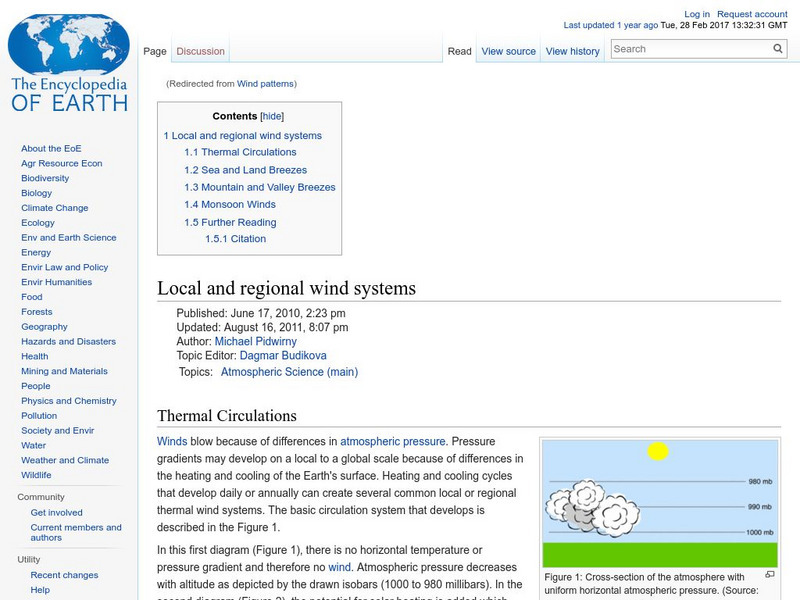Hi, what do you want to do?
Curated OER
Convection Activities
Students conduct a series of hands-on activities to demonstrate that heated air expands and that warm air rises because it is less dense.
Curated OER
Clouds
Test your students' science and/or reading comprehension skills with this activity, which provides a page of information about clouds and cloud classification. Both an earth science teacher and a language arts teacher could use this...
Curated OER
Redefining an Earthquake
Ninth graders build an "Earthquake Machine" (a manipulative model of a fault line) and use it to explore stick-slip behavior of some faults and to develop a more accurate definition of an earthquake and its causes.
Curated OER
Weather Patterns
Students use yearly averages over a five-year period to understand weather trends for a specific area.
Curated OER
Weather Dance
Students study weather and focus on specific dance concepts. They are introduced to different ty es of clouds and how they are formed. Next, they study wind and why it occurs.
Curated OER
Does Humidity Affect Cloud Formation?
Students use NASA's S'COOL database to identify factors that affect cloud formation.
Curated OER
Volcanoes:How Safe Are They?
Young scholars explore volcanoes, locate them on maps, record general information about volcanoes, and organize information on a fact sheet.
Curated OER
Creating a Thematic Map Using S'COOL Data
Students observe weather patterns, collect data, and make a weather predictions for various locations on a map.
Curated OER
Hurricane Scavenger Hunt
Fourth graders use Internet and/or library resources to locate and record information about hurricanes on a worksheet..
Curated OER
Cloud Databases
Students complete a unit on clouds and a report about one type of cloud. They collect data through observation about different types of cloud cover and then create a spreadsheet to reflect their observations over a 2 week period.
CK-12 Foundation
Ck 12: Earth Science: Electromagnetic Energy in the Atmosphere Study Guide
[Free Registration/Login may be required to access all resource tools.] Summarizes the key points about electromagnetic waves and how they are classified. Includes a few questions to check for understanding.
CK-12 Foundation
Ck 12: Earth Science: Electromagnetic Energy in the Atmosphere
[Free Registration/Login may be required to access all resource tools.] Overview of electromagnetic radiation.
CK-12 Foundation
Ck 12: Earth Science: Electromagnetic Energy in the Atmosphere
[Free Registration/Login may be required to access all resource tools.] Overview of electromagnetic radiation.
BioEd Online
Bio Ed Online: Rainbow in the Room
Learners investigate the properties of visible light and the sequence of colors in the spectrum using light shone through water and prisms. The lesson and accompanying slideshow can both be downloaded.
NASA
Nasa Earth Observatory: Global Maps: Net Radiation
View a global map from NASA's Earth Observatory that shows net radiation from July 2006 to November 2008. Learn about radiation and the balance between incoming and outgoing energy in the atmosphere.
TED Talks
Ted: Ted Ed: A Guide to the Energy of the Earth
Energy is neither created nor destroyed - and yet the global demand for it continues to increase. But where does energy come from, and where does it go? This video examines the many ways in which energy cycles through our planet, from...
Simon Fraser University
Chem1 Virtual Textbook: Structure and Composition of the Atmosphere
As part of the General Chemistry Virtual Textbook, this site examines a variety of topics related to Earth's atmosphere. Topics covered in the overview include structure of the atmosphere, composition of the atmosphere, energy balance of...
Geographypods
Geographypods: Patterns in Environmental Quality and Sustainability
This collection of five learning modules looks at issues related to environmental change and sustainability. Topics addressed include changes in the atmosphere, soil, water, and biodiversity, and what can be done to counteract this and...
Annenberg Foundation
Annenberg Learner: The Habitable Planet: Energy Challenges
With this resource, users join investigators in the exploration of humans' use of and dependence on the many energy resources. Learn about new technologies such as carbon capture and sequestration as an alternative to reduce our carbon...
Science Buddies
Science Buddies: Tracking Geomagnetic Storms in the Ionosphere
The Sun is the ultimate source of the energy that powers weather systems on Earth. Geomagnetic storms are sun-powered storms in the upper atmosphere, arising from energized particles that are periodically ejected by the Sun. Among other...
Encyclopedia of Earth
Encyclopedia of Earth: Local and Regional Wind Systems
Read about regional and local wind systems, including information on changes in atmospheric pressure, thermal energy in the atmosphere, sea and land breezes, mountain and valley breezes, and monsoon winds.
PBS
Pbs Learning Media: Above the Clouds: Telescopes on Mauna Kea
This video segment adapted from First Light explains why the highest peak in the Pacific, Mauna Kea, is an ideal site for astronomical observations. Featured are new telescope technologies that allow astronomers to explore the universe...
Annenberg Foundation
Annenberg Learner: The Habitable Planet: Energy Lab
Try and meet global energy demands by using alternative energy sources while keeping the carbon levels in the atmosphere down to acceptable levels. Simulator includes a data table available for download for student records.


















